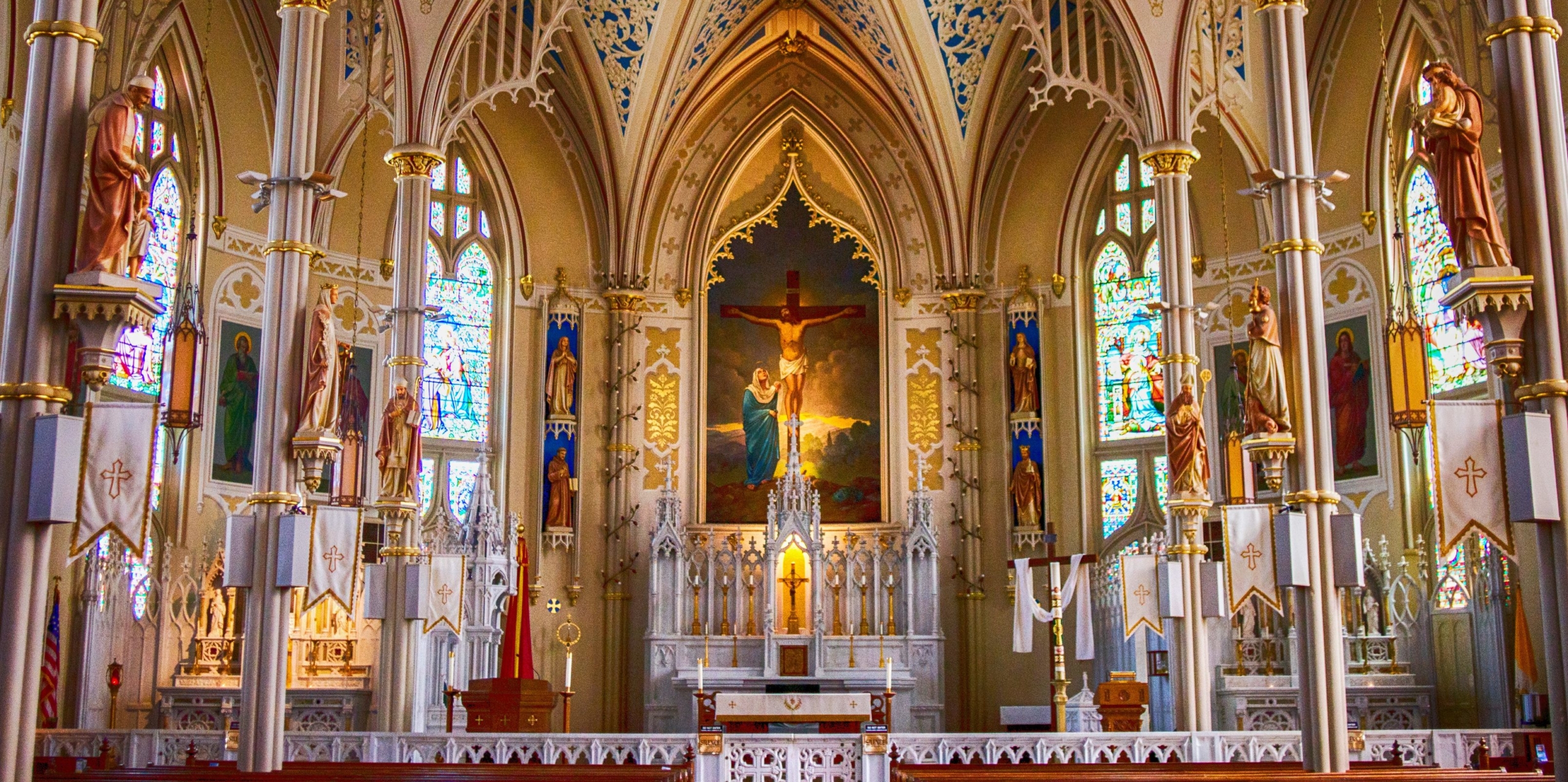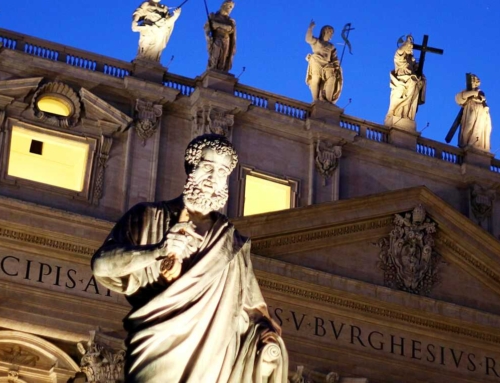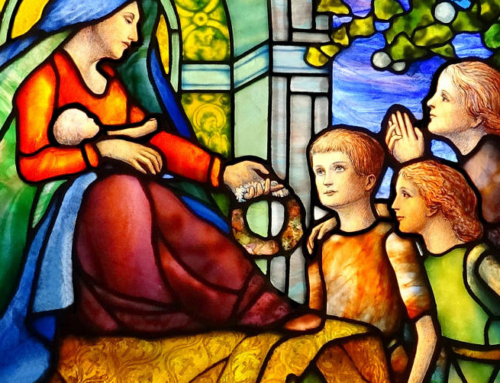Brother Reginald, the personal assistant to St. Thomas Aquinas (1225-1275), once spied the great theologian in prayer before the Blessed Sacrament. According to Brother Reginald’s account, Thomas was agonizing over whether he had written accurately of the central mystery of our faith, the Eucharist, and was presenting his concerns to the Lord.
At that very moment a voice came from the crucifix above the altar: “Thomas, you have written well of me. What do you desire?”
“Nothing but you,” replied the saint.
There is no other reply to such a question, is there? No gift or blessing could equal God Himself.
The Central Mystery
Such is the Catholic belief in the Eucharist. After the words of consecration, pronounced by the priest at Mass, the bread and wine are transformed (the technical term is “transubstantiated”) into the Body and Blood, Soul and Divinity of Jesus Christ. Catholics call this a miracle, but no outward sign accompanies it as normally occurs in a miracle. We must see this miracle with the eyes faith.
This central mystery of our faith is ours to partake of every day, and no human being, even one with the intelligence of a Thomas Aquinas, can ever fathom the grace. We can, however, dispose ourselves to receive it in a manner fitting its very name: Eucharist means “thanksgiving”.
A Pope Who Proclaimed This Gift
While the Church has believed in the divine nature of the Eucharist since the apostolic age, a singular pope in the Middle Ages had an enormous effect on the teaching during a reign that was to last only three years. Pope Urban IV, a Frenchman, established the feast of Corpus Christi to bring to greater fruition the Church’s teaching that the Eucharist is the “real presence” of Christ, the very Body and Blood of Christ Himself, hidden under the species of bread and wine.
In 1264, Urban officially authorized the creation of a Mass and liturgical festival to promote these truths as well as the practice of worship of the Eucharist outside of Mass, a trend that had been growing in the heart of the Church for centuries. It had been strongly promoted by a Belgian nun, Juliana of Liege, during the previous fifty years. The Pope then tapped the famous Dominican friar, Thomas of Aquino, to write the prayers and hymns for the festival.
What a blessed decision that was! The prayers we say at Mass to this day on the Feast of Corpus Christi are the very same ones that Thomas dictated to Reginald in some lonely Dominican priory in the 13th century. Among the hymns Thomas wrote are some familiar names to those who make Eucharistic Adoration a regular practice: Pange lingua, Tantum ergo, and Panis angelicus.
No doubt St. Thomas would have been overcome with deep emotion hearing his countryman, Luciano Pavarotti, some seven centuries later, sing the Panis Angelicus for the successors of Pope Urban at papal ceremonies.
The Adoro Te Devote Prayer
Thomas’ exquisite seven-verse Latin poem called the Adoro Te Devote is in itself a sublime short-course on the spirituality of the Eucharist. We may call it St. Thomas Aquinas’ own Eucharistic Prayer. Scholars seem to think that it was a private prayer that Thomas himself prayed in the presence of the Blessed Sacrament before it ever became a part of the Corpus Christi liturgy.
What follows are two performances of the Latin hymn, Adoro Te Devote, the second being that of a group in Chile that filmed an inspiring Eucharistic procession as the background to their singing. The first is straight Gregorian Chant, as St. Thomas would have sung it to himself in the privacy of his chapel.
Below the videos are two versions of the hymn: the Latin original of the prayer written by Thomas and a worthy translation into English by the 19th century Jesuit poet, Gerard Manley Hopkins.
The Performances (duration, 3:05 and 6:41)
Adoro te devote, latens Deitas,
quae sub his figuris vere latitas:
tibi se cor meum totum subiicit,
quia te contemplans totum deficit.
Visus, tactus, gustus in te fallitur,
Sed auditu solo tuto creditur.
Credo quidquid dixit Dei Filius;
Nil hoc verbo veritátis verius.
In cruce latebat sola Deitas,
At hic latet simul et Humanitas,
Ambo tamen credens atque confitens,
Peto quod petivit latro pœnitens.
Plagas, sicut Thomas, non intueor:
Deum tamen meum te confiteor.
Fac me tibi semper magis credere,
In te spem habere, te diligere.
O memoriale mortis Domini!
Panis vivus, vitam præstans homini!
Præsta meæ menti de te vívere,
Et te illi semper dulce sapere.
Pie Pelicane, Jesu Domine,
Me immundum munda tuo sanguine:
Cujus una stilla salvum facere
Totum mundum quit ab omni scelere
Jesu, quem velatum nunc aspicio,
Oro, fiat illud quod tam sitio:
Ut te revelata cernens facie,
Visu sim beátus tuæ gloriæ.
Godhead here in hiding, whom I do adore,
Masked by these bare shadows, shape and nothing more,
See, Lord, at Thy service low lies here a heart
Lost, all lost in wonder at the God thou art.
Seeing, touching, tasting are in thee deceived:
How says trusty hearing? that shall be believed;
What God’s Son has told me, take for truth I do;
Truth Himself speaks truly or there’s nothing true.
On the cross Thy godhead made no sign to men,
Here Thy very manhood steals from human ken:
Both are my confession, both are my belief,
And I pray the prayer of the dying thief.
I am not like Thomas, wounds I cannot see,
But can plainly call thee Lord and God as he;
Let me to a deeper faith daily nearer move,
Daily make me harder hope and dearer love.
O thou our reminder of Christ crucified,
Living Bread, the life of us for whom he died,
Lend this life to me then: feed and feast my mind,
There be thou the sweetness man was meant to find.
Bring the tender tale true of the Pelican;
Bathe me, Jesu Lord, in what Thy bosom ran
Blood whereof a single drop has power to win
All the world forgiveness of its world of sin.
Jesu, whom I look at shrouded here below,
I beseech thee send me what I thirst for so,
Some day to gaze on thee face to face in light
And be blest for ever with Thy glory’s sight. Amen.

Soul Work
Sublime worship flows out of the lives of saints like Thomas Aquinas as naturally as speaking and breathing. We would do well to spend time with the lyrics of this great Eucharistic hymn to see what images and sentiments motivated Thomas’s love for Christ. Our prayer should be to take those truths into hear hearts and make them our own.
Above all, go to Mass early every Sunday. Take the words of this hymn with you. Sit with the prayer in silence and reflection. Let its truth lead you into total adoration of your Lord, Jesus Christ, in the Eucharist.




Magnificent
So glad you like it Judith! Our Christian Tradition is so deep and rich. All the best, PD
[…] went on to write the series of sublime mystical poems we now know as the prayers and hymns for the Mass of Corpus Christi, a feast that was established just ten years before Thomas’ death at the age of […]
[…] Thomas Aquinas’ Eucharistic Heart and Hymn […]